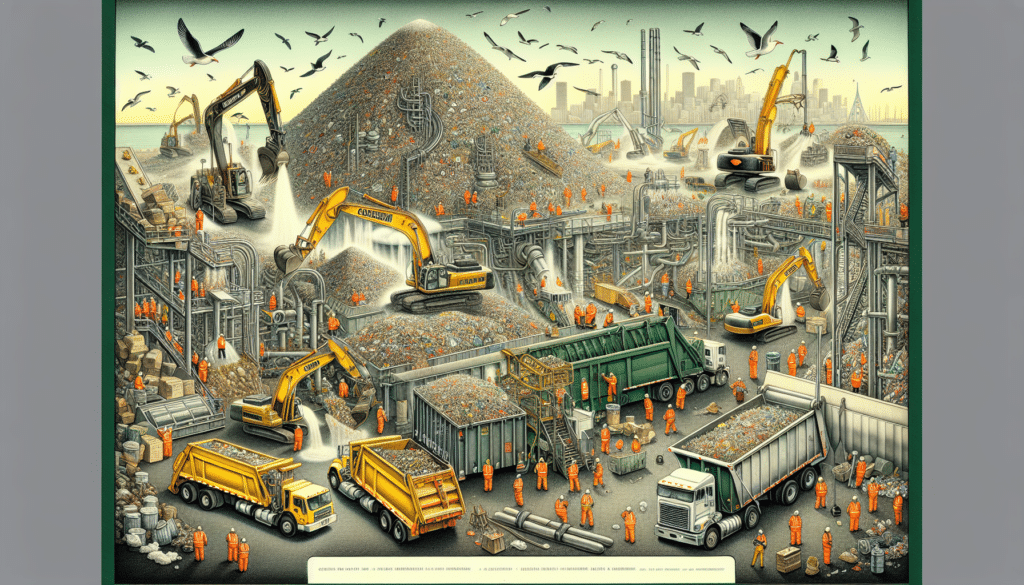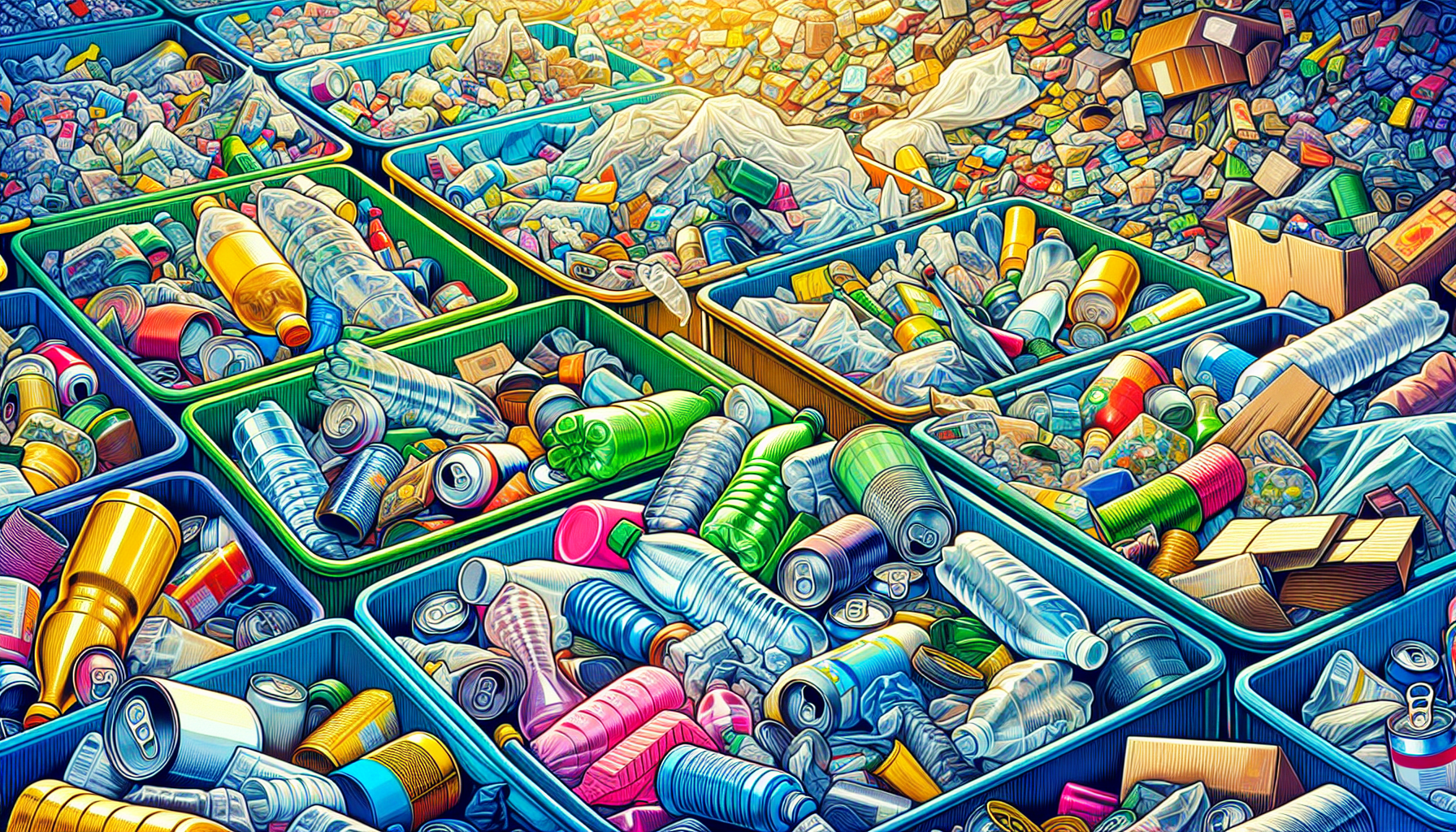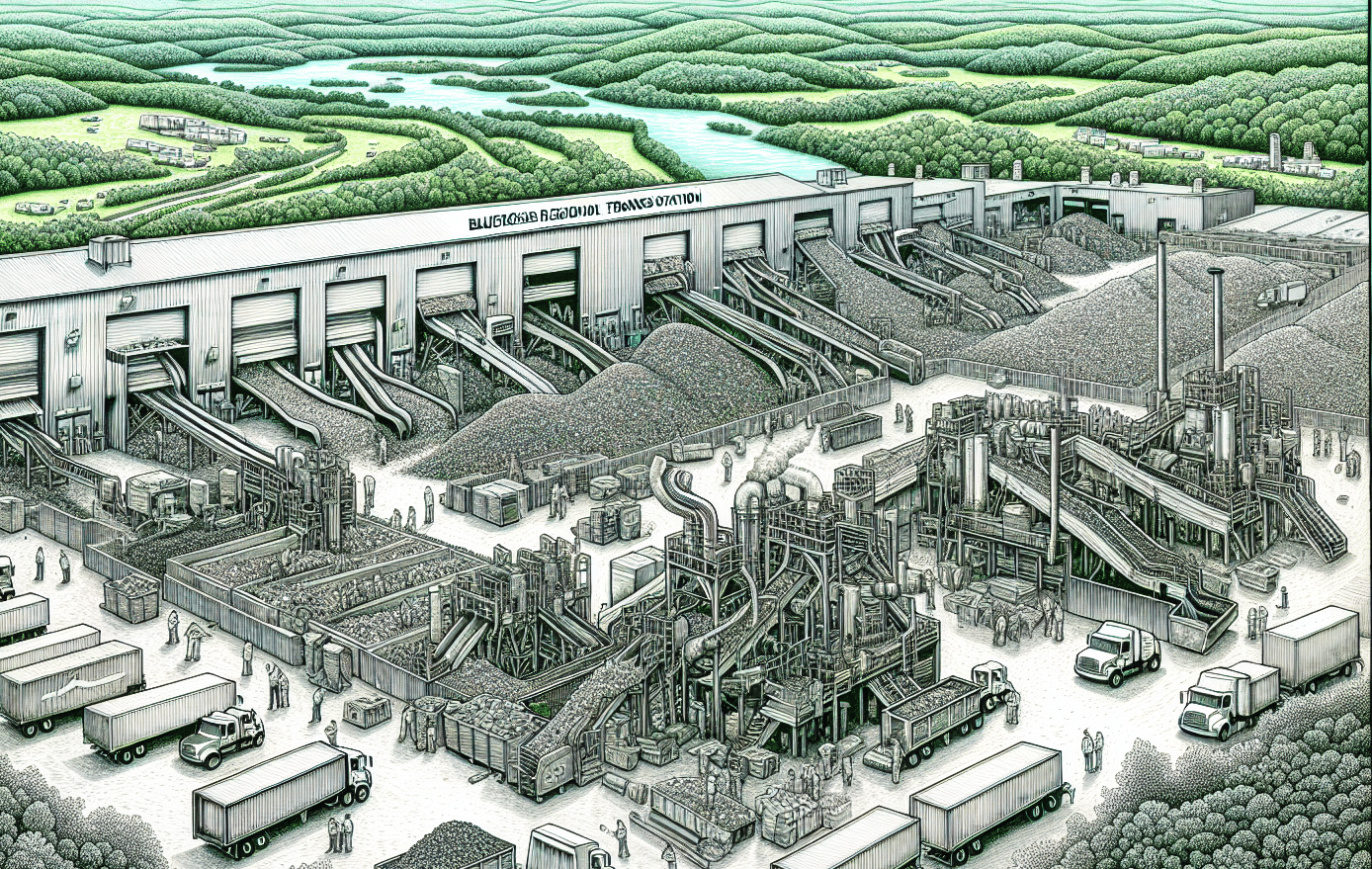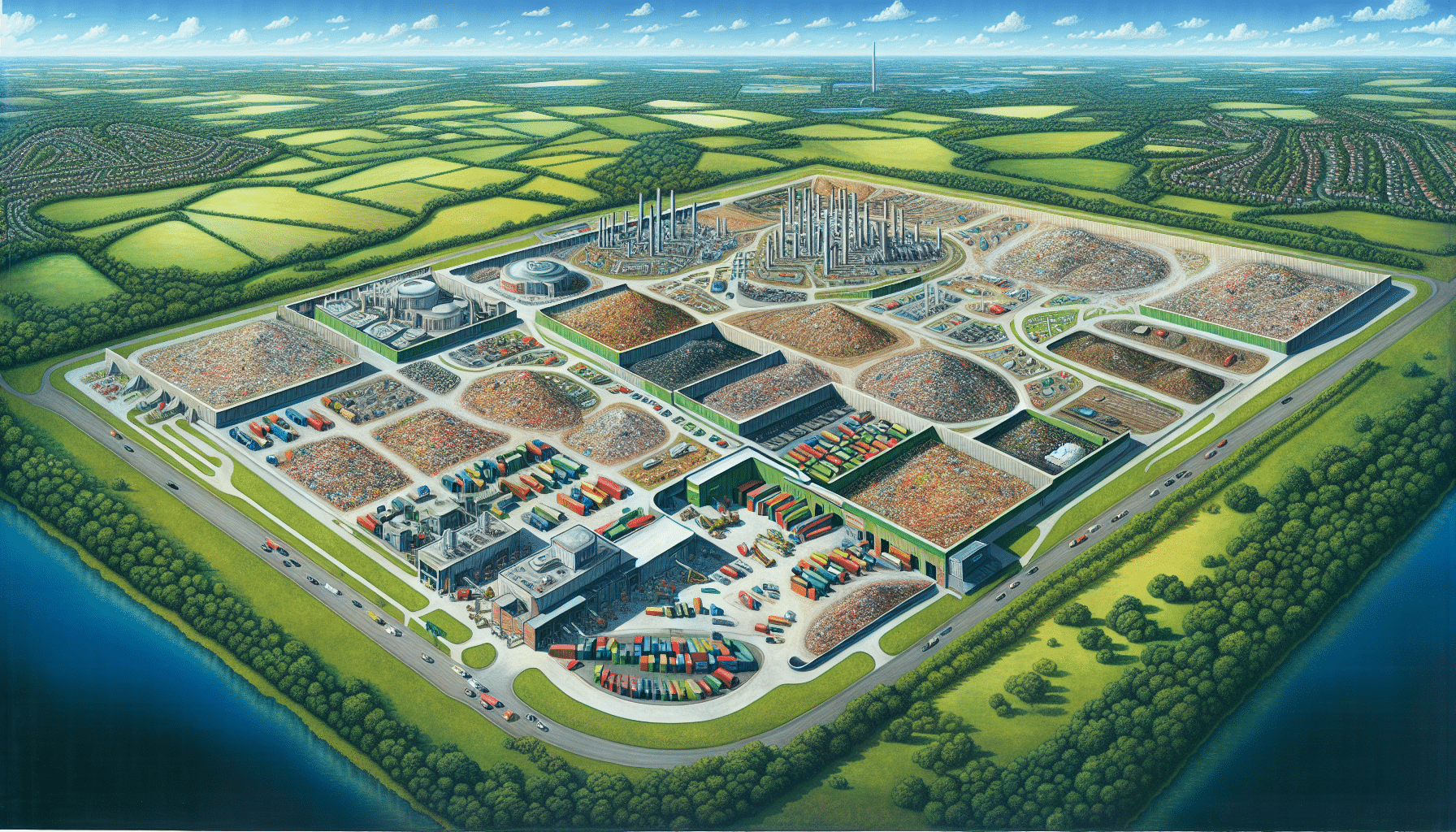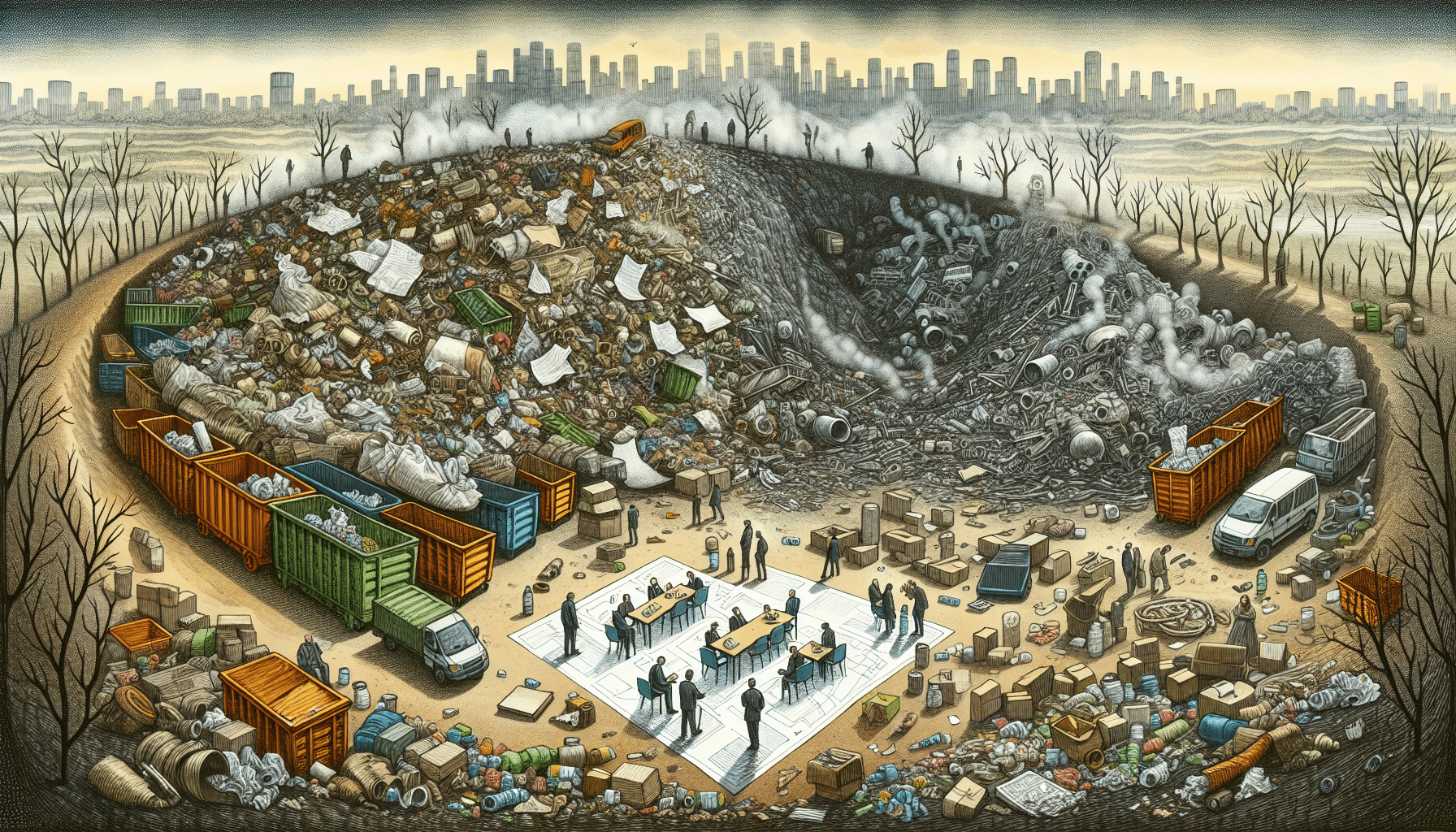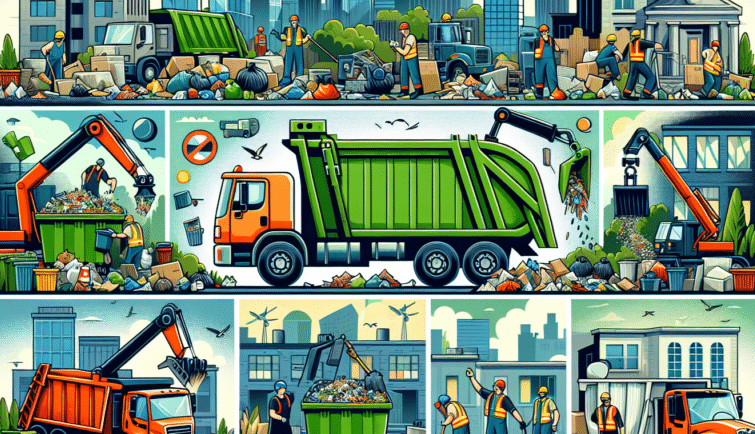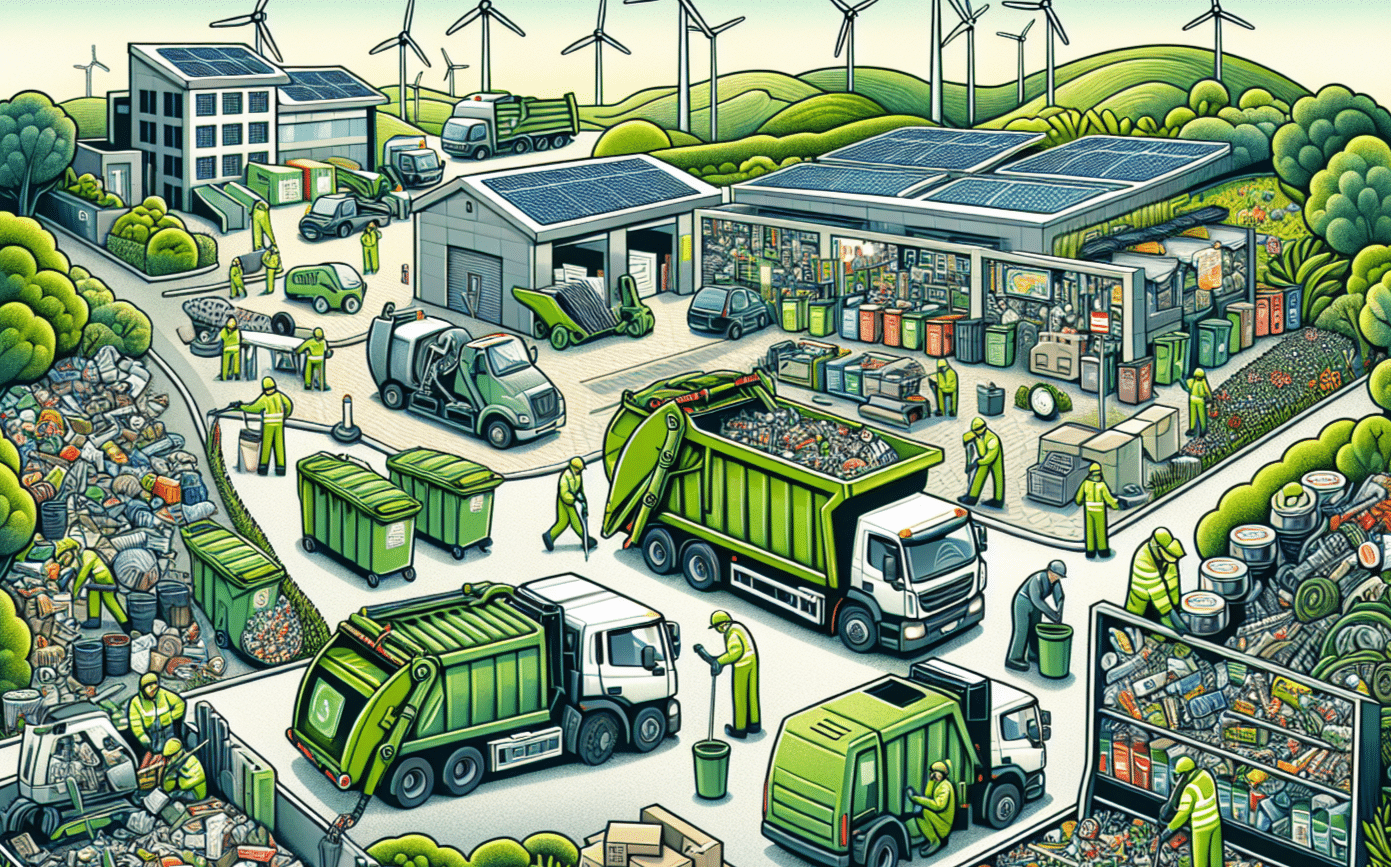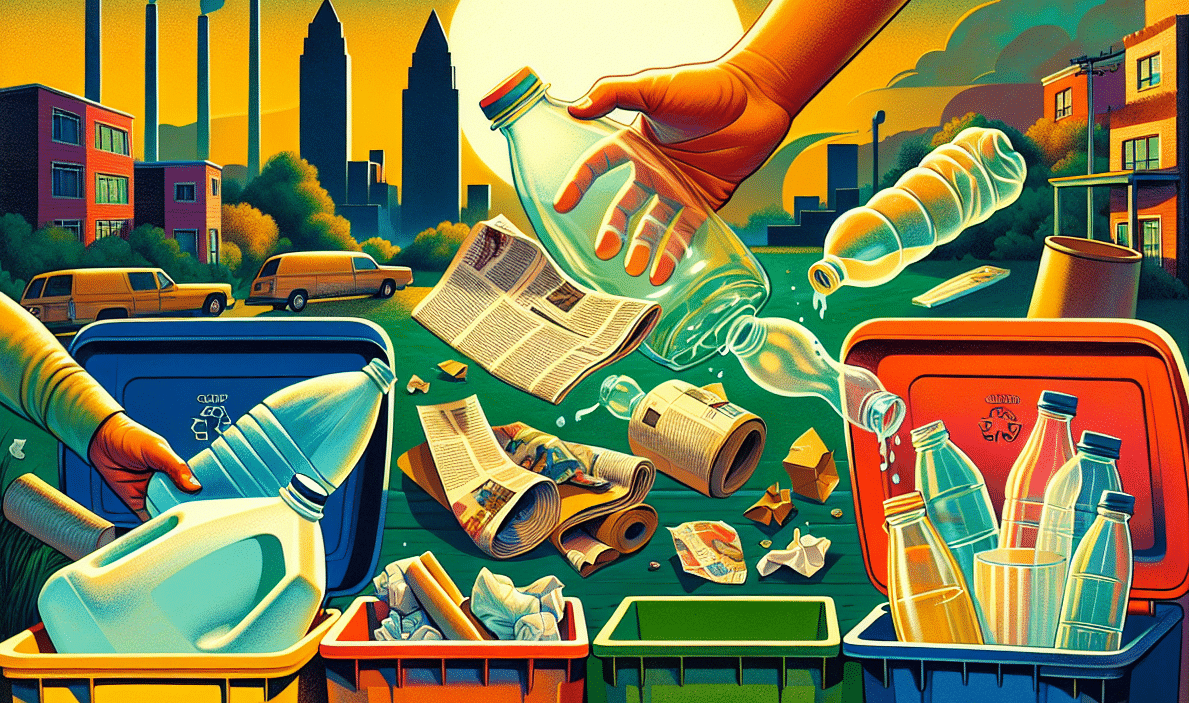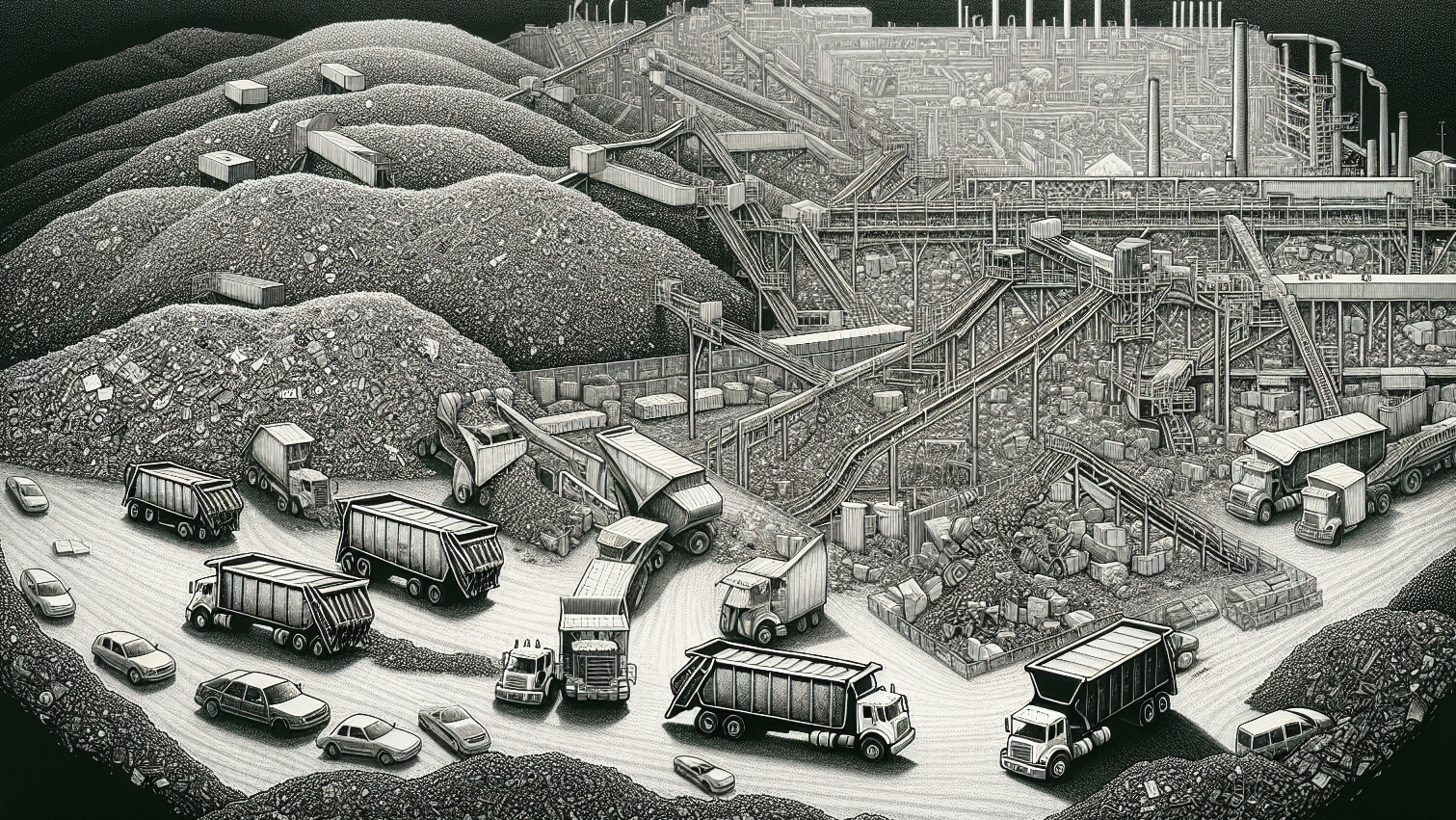In Oakland, CA, landfills play a pivotal role in waste management. Our concise guide details landfills in Oakland, CA, including these facilities’ locations, accepted waste, hours, and fees to help you manage your disposal needs effectively. With a focus on Oakland’s commitment to sustainability, we’ll navigate recycling options and provide guidelines for handling specific waste types, promoting environmentally responsible practices.
Key Takeaways
- Oakland operates designated landfills and recycling facilities to manage waste responsibly, emphasizing the importance of proper disposal and resource conservation through strategic waste stream categorization and innovative practices.
- The city implements various waste management programs, including household hazardous waste disposal, curbside recycling services, and specialized recycling for e-waste and concrete, supporting its goal of achieving zero waste and environmental sustainability.
- Oakland offers comprehensive bulk and green waste solutions, including collection services, dumpster rentals, and drop-off facilities. It also advances waste management technology with a planned high-capacity recycling facility employing innovative sorting systems.
Understanding Oakland’s Landfill Operations
Oakland’s landfill operations are crucial in the city’s waste management mechanism. The city’s landfills, namely the Altamont Landfill and Davis Street Transfer Station, provide a designated place for proper waste disposal. Everything from grass clippings to furniture and household cleanout debris ends up in these facilities.
Adherence to regulatory requirements and innovative practices within landfill operations translate into significant environmental benefits, including environmental compliance. This includes a reduced risk of contamination and enhanced waste management, ensuring that Oakland’s landfills are more than just disposal sites—they’re critical to the city’s environmental health and landfill development.
Types of Landfills in Oakland
Oakland’s landfills handle specific types of waste, reflecting the city’s strategic approach to waste management. For instance, construction landfills are designed to accommodate waste generated from construction, renovation, and demolition activities. These facilities accept materials like:
- Wood
- Soil
- Cardboard
- Asphalt
- Concrete
- Glass
- Metal
The city also operates dirt dumps—designated areas where clean soil, free from hazardous materials, pesticides, or harmful substances, can be safely disposed of or recycled. Recycling clean soil and adequately disposing of mixed concrete help to conserve natural resources and minimize waste, which, in turn, reduces environmental contamination risks.
Fees and Costs
Costs are inevitable in waste management, and Oakland is no exception. The financial aspect of waste disposal is primarily influenced by landfill tipping fees—costs imposed on waste disposal in landfills. These fees affect residents and businesses, shaping the overall cost of waste disposal services.
Beyond tipping fees, additional costs also come into play to cover enterprise-wide costs. Charges such as the environmental charge, load rate, and fuel surcharge add to the total cost of managing waste, excluding taxes. While these costs may seem burdensome, they are essential for ensuring the effective and responsible management of waste in Oakland.
Operational Hours and Locations
When disposing of large items, Oakland’s landfills have got you covered. These facilities may accept items such as RVs, mattresses, and box springs, subject to each facility’s specific guidelines and restrictions. This service plays a vital role in managing bulky waste, providing a solution for items that can’t simply be left at the curb for regular trash collection.
Moreover, the landfills’ operational hours and locations are designed to accommodate the needs of Oakland’s diverse residents and businesses. This ensures that everyone has access to the facilities when needed, facilitating the efficient and timely disposal of waste across the city.
Recycling Facilities: Paving the Way to Zero Waste
In addition to landfills, Oakland boasts a range of recycling facilities, each playing a pivotal role in managing the city’s waste stream. A wide array of materials are processed by these facilities, including:
- Paper (excluding food-soiled paper)
- Cardboard
- Glass
- Aluminum cans
- Steel cans
- Plastic bottles
- Certain types of electronics
Recycling metal waste, in particular, significantly impacts the environment. Recycling metals and natural resources substantially reduces greenhouse gas emissions, contributing to the city’s goal of zero waste.
From Curbside Pickup to Facility Processing
Oakland’s waste management strategy also involves curbside collection programs, making recycling convenient for residents. These programs facilitate the disposal of used oil and household batteries, which are then processed at recycling facilities.
Residents can recycle used motor oil and filters through this program. Here’s how:
- Place the used oil in an approved jug.
- Place the filters in a zip-tight bag.
- Place these recyclable materials curbside next to the recycle cart for pickup by the recycling facility.
This environmental systems approach makes it easy for residents to recycle these items in an environmentally responsible manner, helping to keep harmful substances out of the waste stream.
Specialized Recycling: Electronics, Concrete, and More
Beyond the usual recyclables, Oakland’s waste management system also caters to more specialized waste streams. For instance, concrete is classified into two categories: clean concrete, free of contaminants, and mixed concrete, containing other materials. Recycling clean concrete reduces waste in landfills and saves natural resources. Recycled clean concrete has many uses, including road base and landscaping, and serves as aggregate in new concrete. This versatility makes it a valuable resource for sustainable construction.
Electronic waste, or e-waste, is another waste material that requires specialized recycling. These end-of-life electronic products contain hazardous materials and must be handled differently from other recyclables. By catering to these specialized waste streams, Oakland ensures that all types of waste are managed responsibly, reducing environmental contamination risks.
Hazardous Waste Disposal: Keeping Oakland Safe
Safety is paramount when dealing with waste, especially when it comes to hazardous waste. In Oakland, household hazardous waste (HHW) includes a variety of materials, such as chemicals that can be toxic, flammable, or corrosive. These materials, generated from household products, are considered hazardous waste and require special handling to prevent environmental contamination and ensure safety.
To facilitate the safe disposal of hazardous waste, the Household Hazardous Waste Facility in Oakland allows residents to dispose of up to fifteen gallons per vehicle visit. This service is crucial in keeping hazardous materials out of the regular waste stream, contributing to Oakland’s safety and environmental well-being.
Household Hazardous Waste
Oakland’s Household Hazardous Waste Facility provides citizens with a certified drop-off location for various hazardous materials. Located at 2100 East 7th Street, this facility is a critical resource for residents, ensuring that hazardous waste is handled correctly.
Improper disposal of hazardous substances can result in soil contamination, stemming from:
- Industrial activities
- Landfills
- Accidental spills
- Other sources
By providing a dedicated facility for hazardous waste disposal, Oakland mitigates these risks, protecting its environment and the health of its residents.
Commercial Hazardous Materials
Businesses also deal with hazardous materials that require special handling and disposal procedures on the commercial front. For example, concrete contaminated with hazardous materials must be disposed of as hazardous waste, following specific environmental regulations.
Commercial drivers and businesses must adhere to these guidelines to ensure legal and safe practices. Furthermore, companies are responsible for covering all costs associated with the disposal of hazardous materials, including special handling, transportation, and disposal. This ensures that commercial operations in Oakland are held to the same high standards of environmental responsibility as residential ones.
Bulk and Green Waste Solutions
Oakland has robust solutions in place for managing large items and organic waste. Clean wood, in its untreated and unpainted state, is free from contaminants like nails, screws, or staples. This makes it a desirable material for various woodworking projects. Ensuring the proper disposal of clean wood waste is essential to avoid contaminating other waste streams and reduce the waste volume going to landfills. Clean wood can be recycled into valuable products such as mulch, animal bedding, or fuel. This helps reduce waste and benefits the environment by utilizing organic materials.
In addition, the city manages the disposal of composition bulk roofing materials and tires. These materials may be required by local regulations to be separated and transported to designated landfill facilities or can be recycled into new products. By providing solutions for bulky waste management, Oakland ensures that even the largest items are disposed of responsibly.
Bulky Item Collection Services
Oakland offers collection services for oversized items such as furniture and appliances. This helps residents dispose of bulky waste responsibly. Some examples of items that can be collected include:
- Old couches
- Outdated washing machines
- Broken refrigerators
- Used mattresses
These collection services, provided by a local technical service representative, ensure that large items don’t end up littering the city’s streets or alleys.
Moreover, residents are eligible for one free bulky waste curbside pickup per year, which includes a limited number of oversized items like appliances, mattresses, and tires. Multifamily properties in Oakland also have access to up to four cubic yards of curbside bulky collection services annually.
Electronic waste is accepted through Oakland’s Bulky Junk Services, with curbside and drop-off disposal options. These services make it easier for residents to manage bulky waste, creating a cleaner and more sustainable Oakland.
Composting and Yard Debris
Composting and yard debris management are crucial to Oakland’s waste management strategy. The new California state law SB 1383 aims to keep compostable materials out of landfills, highlighting the importance of proper green waste management.
In Oakland, residents can compost various materials like food scraps and plant debris while avoiding introducing plastic bags, ‘compostable’ plastic food ware, diapers, and pet waste into compost bins. Implementing composting through a three-bin system significantly reduces greenhouse gas emissions due to decomposing organic waste. It contributes to diverting over a third of waste from general waste bins, helping Oakland make substantial progress towards achieving a more sustainable future.
Smart Sorting Systems for Efficient Waste Management
Oakland is also pioneering new technologies to improve waste management. The city plans to build a new recycling facility capable of handling up to 850 tons per day of recyclable materials. This facility, operated by California Waste Solutions (CWS) in West Oakland, will incorporate state-of-the-art sorting technologies, contributing to the city’s efforts to divert more material from landfills.
These smart sorting systems are part of a broader trend towards more efficient waste management practices in Oakland. By leveraging technology, the city can handle a larger volume of waste, recycle more materials, and reduce the amount of waste in landfills.
Three-Bin System: Recycle, Compost, Trash
Part of Oakland’s efficient waste management strategy involves implementing a three-bin system. This system, consisting of separate bins for recycling, composting, and trash, promotes better waste sorting and material recovery.
Residents are encouraged to recycle materials in the recycle cart, allowing these items to be repurposed into new products. Composting services are mandated by Oakland’s legislation to reduce harmful methane emissions by properly composting materials like food scraps and plant debris. The three-bin system is both environmentally friendly and economically efficient, offering better value for money by improving material recovery rates compared to other waste management systems.
Tips for Reducing Contamination
In addition to implementing efficient waste sorting systems, reducing contamination in recycling efforts is important. For instance, household batteries can be recycled by placing them in a clear zip-lock bag and setting the bag on top of the recycle cart during regular pickup.
To ensure safe recycling, batteries should be separated, with button-cell and Ni-Cadmium batteries in individual clear bags. To avoid short-circuiting, both ends of these batteries should be taped before being placed in clear bags for recycling. Following these simple tips can go a long way in ensuring that recycling efforts are safe and effective.
Dumpster Rental and Large Load Drop-Offs
For those undertaking big projects or cleanouts, Oakland offers dumpster rentals. These services provide a convenient solution for managing large amounts of waste, ensuring it is disposed of responsibly and efficiently.
The city offers several sizes of roll-off dumpsters for temporary waste solutions, ranging from ten to forty yards.
They also offer a range of container sizes, from twenty-gallon carts to seven-cubic-yard containers. Whether renovating your home or cleaning out an estate, there’s a dumpster size to suit your needs.
Choosing the Right Dumpster Size
Selecting the right dumpster size is crucial to efficient waste management. A ten or twenty-yard dumpster usually suffices for minor renovations or home cleanouts. However, larger projects such as estate cleanouts or demolitions may necessitate thirty to forty-yard dumpsters.
When renting a dumpster, it’s essential to consider the following:
- Ensure there’s adequate space for placement
- Check if a permit is required for street placement
- Choose the right dumpster size
- Pead to ensure your waste management needs are met without any hitches.
Accessing Drop-Off Facilities
For those who prefer to drop off their waste directly, Oakland’s disposal areas at the Davis Street Transfer Station are accessible. However, safety is a priority at these sites, and individuals must wear a safety vest and a hard hat when accessing these areas.
In addition to safety, proper waste disposal practices are also crucial. Residents, including those living in apartments, can schedule a one-time free drop-off of up to four cubic yards of bulky waste at the Davis Street Resource Recovery Complex in San Leandro. By providing these services, Oakland ensures everyone can access convenient and responsible waste disposal options.
Summary
In conclusion, Oakland’s commitment to responsible waste management and recycling is clear in its comprehensive range of services—from landfill operations and recycling facilities to hazardous waste disposal and bulk waste solutions. The city is leading the way in sustainable waste management by implementing innovative sorting systems and providing convenient services like dumpster rentals and large load drop-offs. These efforts ensure a cleaner and safer Oakland and pave the way for a more sustainable future.
Frequently Asked Questions
What types of waste can be disposed of in Oakland’s landfills?
In Oakland’s landfills, a wide range of waste can be disposed of, including everyday items like product packaging, grass clippings, furniture, clothing, bottles, food scraps, newspapers, appliances, paint, batteries, and mixed debris from construction, demolition, renovations, and household cleanouts.
How does Oakland facilitate recycling?
Oakland facilitates recycling through various recycling facilities that process materials like paper, cardboard, glass, aluminum cans, steel cans, plastic bottles, and certain electronics, along with curbside collection programs for used oil and household batteries.
What is the Household Hazardous Waste Facility in Oakland?
The Household Hazardous Waste Facility in Oakland is a certified drop-off location for various hazardous materials, playing a crucial role in ensuring the safety and environmental well-being of the city.
What is the three-bin system in Oakland?
The three-bin system in Oakland consists of separate bins for recycling, composting, and trash, promoting better waste sorting and material recovery for more efficient and environmentally friendly waste management.
What services does Oakland offer for large waste management projects?
Oakland offers dumpster rentals in various sizes, collection services for large items, and a one-time free drop-off of bulky waste at the Davis Street Resource Recovery Complex.
